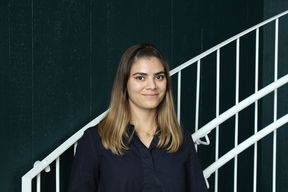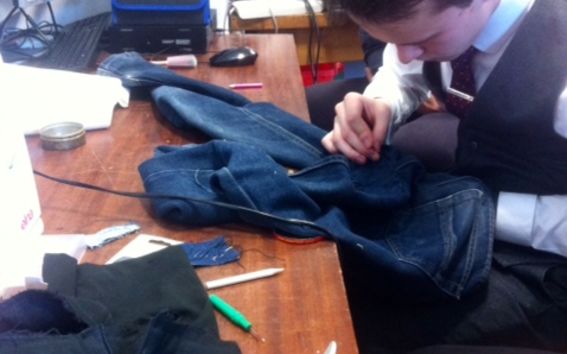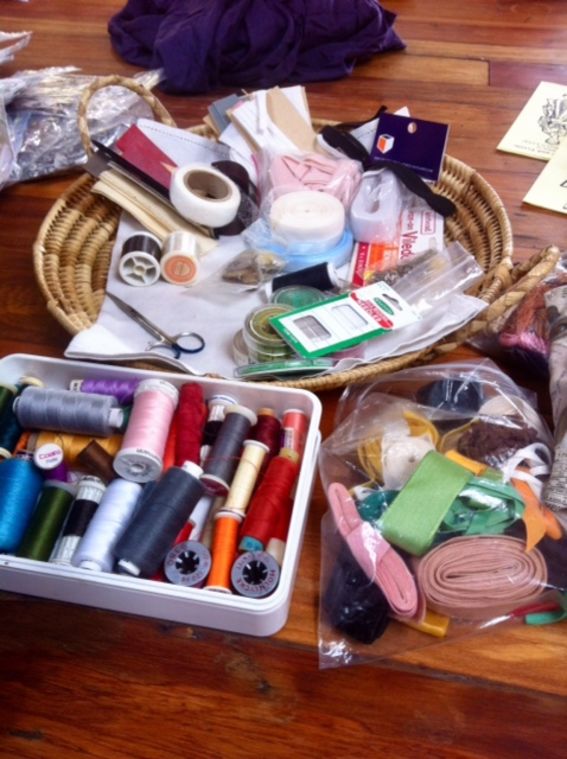Revival of garment mending: communal reskilling addresses global issues of textile waste

What is your research about?
I research garment mending practices that take place in self-organized communal repair events.Through my research I try to understand what is gained from experiencing mending first-hand in collective spaces, what the pull of our social relations is and how we can learn from each other and our clothing. I have focused on menders’ material learning, communal learning and environmental learning through field research in Finland, New Zealand and the United Kingdom.
As a researcher, it is interesting to see how a seemingly simple practice such as repairing can bring people together and tie them to a common cause, often enabling future participation in these communal events. The underlying ‘bigger picture’ is that garment mending as a phenomenon is growing globally: there are over a thousand mending cafes going on around the world. Social mending is becoming an actual counter power to the prevailing fast fashion system and as a researcher I find it a significantly timely topic to study.
Marium DurraniGarment mending as a phenomenon is growing globally: there are over a thousand mending cafes going on around the world."
What are your most important findings?
Firstly, the whole meaning of mending changes if you do it alone at home or come out to do it in a social context - and it is not just women alone. The participants include people from various socio-economic backgrounds, genders and age groups that repair a variety of garments - both ‘special’ and every day wear. It is fascinating to see how collectively new meanings around our clothing and an age-old practice are created when mending is given a public platform.

Secondly, through participation in the mending events also helps people to understand more about garment construction, material qualities - i.e. to differentiate between good and bad quality clothing -, realize the importance of extending the use-time of clothing and of course various ways of mending.
Alongside the improvement of the menders’ material knowledge, a sense of appreciation towards a practice as basic as fixing a button also becomes known. Additionally, feelings of caring for not only clothing but our localities and the environment seem to prevail. All in all, the findings indicate there is a huge potential of informal learning and platforms that can aid in finding localized solutions to globalized ecological problems of textile waste.
What can this lead to?

It is important to understand that we are all in this together and so if we want to bring change we have to share the responsibility collectively. We can begin by doing these things on a micro-level and still be able to make a difference in the long-run. This generation wants to learn more about garment care and maintenance, and mending is one way to get back to it again. Thus, it is important to urge policy-makers to support these activities everywhere.
In Finland, these events are more pop-up, the mending organizers in Helsinki in particular hosted events in various public spaces that organizers could access depending on the cost for renting the space. Not having enough funds often stands as a barrier to having frequent mending events. Policy-makers could then support informal local platforms and create sustainable systems that nourish activities aimed at extending the use-time of existing garments.
Furthermore, local municipalities and funding agencies could support the local community hubs and social enterprises involved with hosting these events by providing permanent spaces to regularize mending practices. This is currently operational in New Zealand, and other countries, including Finland, could also benefit from doing this. For example libraries are an established network for reaching people and offering space for such activities.
Lastly, for future research, empowering communities or ‘garment users’ in this way also opens up the opportunity to explore what new roles fashion designers can play, beyond being the makers of garments, in facilitating the proliferation of communal mending. We need to support avenues that lead to reskilling and assisting people to do garment mending themselves – it is not only valuable but ecological. This is not just another fashionable or ‘trendy’ topic, but a crucial one!
Interested in garment mending? Join us for a Mending event 23 January, 2020 at 15–17 at Harald Herlin Learning Centre, Tori, Otaniemi!
Dissertation of the Month is a new series presenting current dissertations at the School of Arts, Design and Architecture.
Read more:
Freja Ståhlberg: Care-environments should be planned more user-friendly
Read more news

VTT, Aalto University and GTK: How to ensure Finland captures the multi‑billion growth potential of mineral economy
Finland is rising to the forefront of the mineral economy through new research initiatives and closer collaboration
Significant donation to boost pavement engineering research and education
Companies and associations in the field have donated €400,000 to the School of Engineering.
‘Mesoscale’ swimmers could pave way for drug delivery robots inside the body
Researchers have discovered how tiny organisms break the laws of physics to swim faster — such secrets of mesoscale physics and fluid dynamics can offer entirely new pathways for engineering and medicine.






